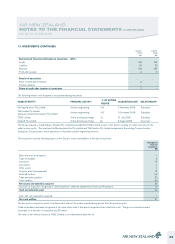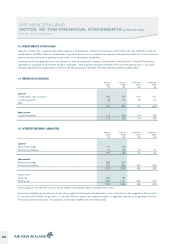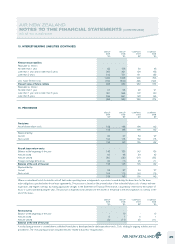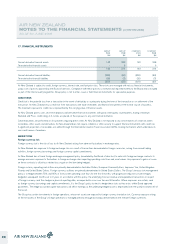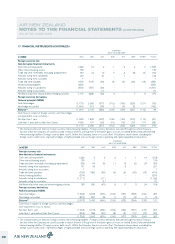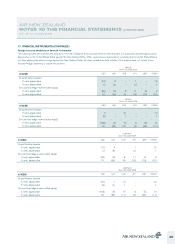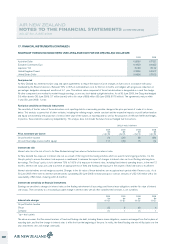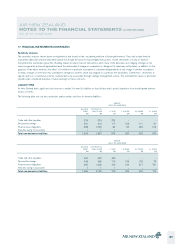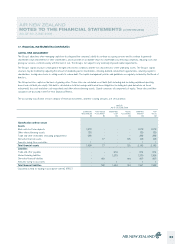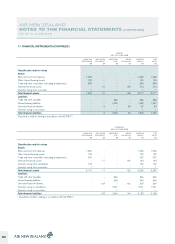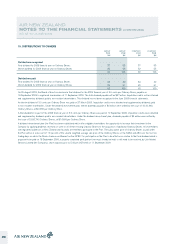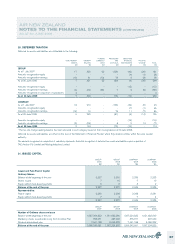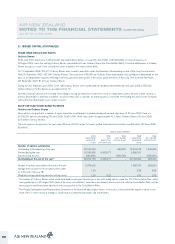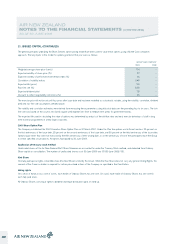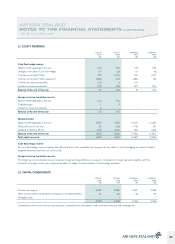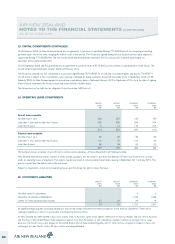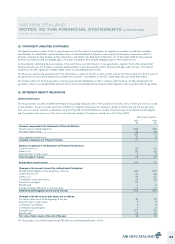Air New Zealand 2009 Annual Report Download - page 35
Download and view the complete annual report
Please find page 35 of the 2009 Air New Zealand annual report below. You can navigate through the pages in the report by either clicking on the pages listed below, or by using the keyword search tool below to find specific information within the annual report.
17. FINANCIAL INSTRUMENTS (CONTINUED)
CAPITAL RISK MANAGEMENT
The Group’s objectives when managing capital are to safeguard the company’s ability to continue as a going concern and to continue to generate
shareholder value and benefits for other stakeholders, and to provide an acceptable return for shareholders by removing complexity, reducing costs and
pricing our services commensurately with the level of risk. The Group is not subject to any externally imposed capital requirements.
The Group’s capital structure is managed in the light of economic conditions and the risk characteristics of the underlying assets. The Group’s capital
structure may be modified by adjusting the amount of dividends paid to shareholders, initiating dividend reinvestment opportunities, returning capital to
shareholders, issuing new shares or selling assets to reduce debt. The capital management policies and guidelines are regularly reviewed by the Board of
directors.
The Group monitors capital on the basis of gearing ratios. These ratios are calculated as net debt (both including and excluding capitalised operating
leases) over net debt plus equity. Net debt is calculated as total borrowings and finance lease obligations (including net open derivatives on these
instruments) less cash and other cash equivalents and other interest-bearing assets. Capital comprises all components of equity. These ratios and their
calculation are disclosed in the Five Year Statistical Review.
The accounting classification of each category of financial instruments, and their carrying amounts, are set out below:
GROUP
AS AT 30 JUNE 2009
LOANS AND
RECEIVABLES
$M
NON-HEDGE
ACCOUNTED*
$M
AMORTISED
COST
$M
HEDGE
ACCOUNTED
$M
CARRYING
AMOUNT
$M
FAIR
VALUE
$M
Classification and fair values
Assets
Bank and short term deposits 1,573 - - - 1,573 1,573
Other interest-bearing assets 130 - - - 130 130
Trade and other receivables (excluding prepayments) 295 - - - 295 295
Derivative financial assets - 17 - 126 143 143
Amounts owing from associates 1 - - - 1 1
Total financial assets 1,999 17 - 126 2,142 2,142
Liabilities
Trade and other payables - - 374 - 374 374
Interest-bearing liabilities - - 1,279 - 1,279 1,306
Derivative financial liabilities - 163 - 144 307 307
Amounts owing to associates - - 1 - 1 1
Total financial liabilities - 163 1,654 144 1,961 1,988
* Classified as held for trading in accordance with NZ IFRS 7.
AIR NEW ZEALAND
NOTES TO THE FINANCIAL STATEMENTS (CONTINUED)
AS AT 30 JUNE 2009
33


